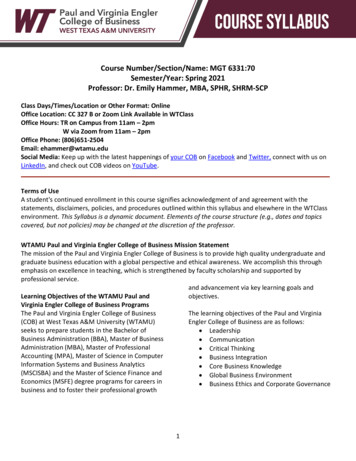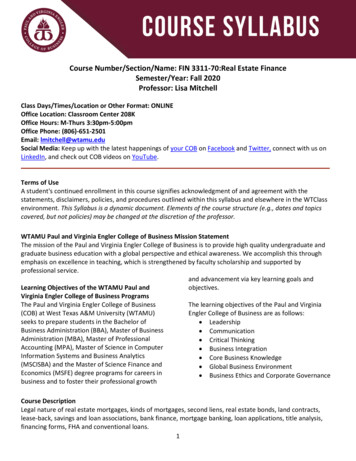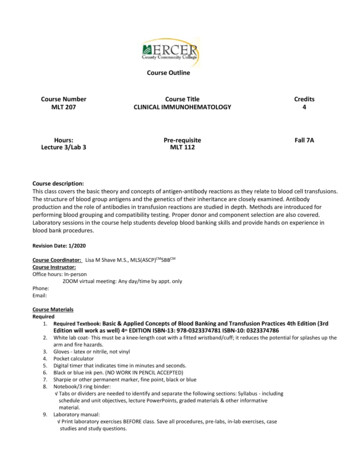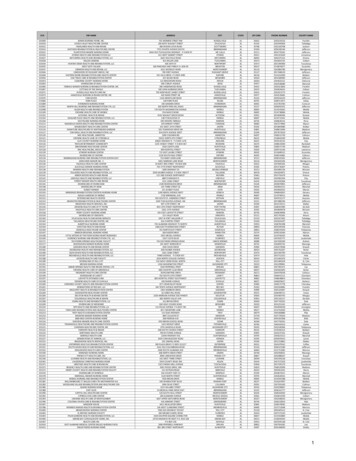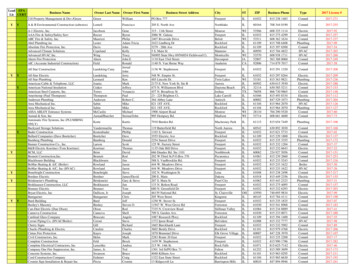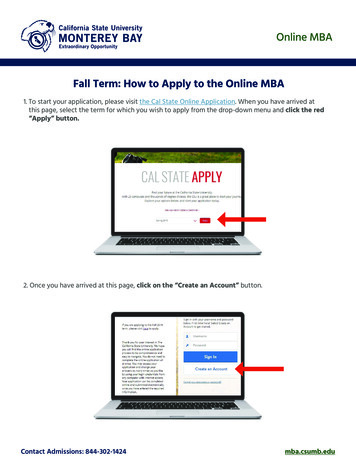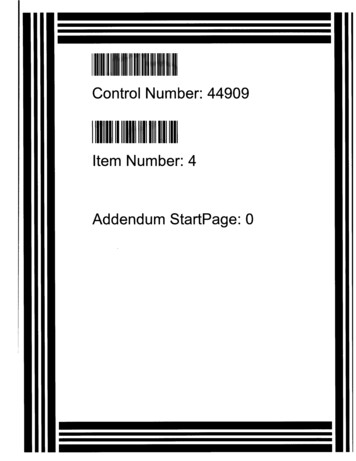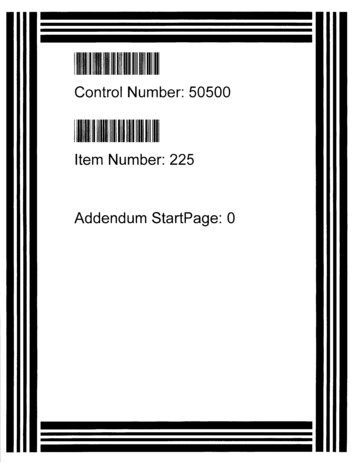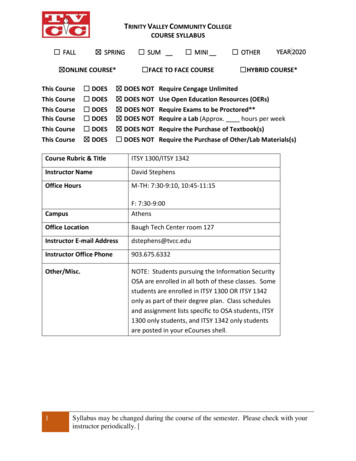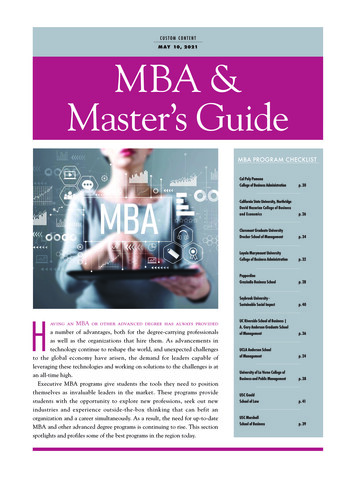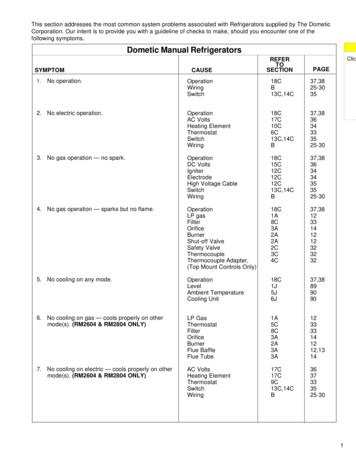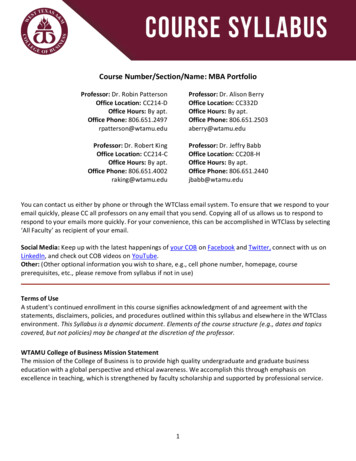
Transcription
Course Number/Section/Name: MBA PortfolioProfessor: Dr. Robin PattersonOffice Location: CC214-DOffice Hours: By apt.Office Phone: 806.651.2497rpatterson@wtamu.eduProfessor: Dr. Alison BerryOffice Location: CC332DOffice Hours: By apt.Office Phone: 806.651.2503aberry@wtamu.eduProfessor: Dr. Robert KingOffice Location: CC214-COffice Hours: By apt.Office Phone: 806.651.4002raking@wtamu.eduProfessor: Dr. Jeffry BabbOffice Location: CC208-HOffice Hours: By apt.Office Phone: 806.651.2440jbabb@wtamu.eduYou can contact us either by phone or through the WTClass email system. To ensure that we respond to youremail quickly, please CC all professors on any email that you send. Copying all of us allows us to respond torespond to your emails more quickly. For your convenience, this can be accomplished in WTClass by selecting‘All Faculty’ as recipient of your email.Social Media: Keep up with the latest happenings of your COB on Facebook and Twitter, connect with us onLinkedIn, and check out COB videos on YouTube.Other: (Other optional information you wish to share, e.g., cell phone number, homepage, courseprerequisites, etc., please remove from syllabus if not in use)Terms of UseA student's continued enrollment in this course signifies acknowledgment of and agreement with thestatements, disclaimers, policies, and procedures outlined within this syllabus and elsewhere in the WTClassenvironment. This Syllabus is a dynamic document. Elements of the course structure (e.g., dates and topicscovered, but not policies) may be changed at the discretion of the professor.WTAMU College of Business Mission StatementThe mission of the College of Business is to provide high quality undergraduate and graduate businesseducation with a global perspective and ethical awareness. We accomplish this through emphasis onexcellence in teaching, which is strengthened by faculty scholarship and supported by professional service.1
The learning objectives of the College of Businessare as follows: Leadership Communication Critical Thinking Business Integration Core Business Knowledge Global Business Environment Business Ethics and Corporate GovernanceLearning Objectives of the WTAMU College ofBusiness ProgramsThe College of Business (COB) at West Texas A&MUniversity (WTAMU) seeks to prepare students inthe Bachelor of Business Administration (BBA),Master of Business Administration (MBA), Masterof Professional Accounting (MPA), and the Masterof Science, Finance and Economics (MSFE) degreeprograms for careers in business and to foster theirprofessional growth and advancement via keylearning goals and objectives.Course DescriptionThe M.B.A. portfolio provides evidence of personal accomplishment and a tangible demonstration of skills andlearning outcomes established for the M.B.A. program.Course ObjectivesThe purpose of the M.B.A. portfolio will be accomplished through the development of a professional portfoliothat demonstrates student growth and accomplishment.The students in this course will:1.2.3.4.Develop a professional resume.Develop a LinkedIn profile.Compose written reflections on selected M.B.A. learning objectives.Compose a personal statement of educational and professional growth and purpose.Software Requirements1. Video recording and processing technology is required. Students will be expected to produce a short, recordedstatement and upload the video to YouTube. The video uploaded will need to be in MP4 or MPEG4 format, orother video types accepted by YouTube. The technology utilized to produce the video will be at the student’sdiscretion.2. A software platform that is PDF capable (e.g., Adobe Acrobat, Microsoft Word, etc.). If you are an on-campusstudent, this software is available for your use in the HELC.2
Map from COB Learning Objectives to Specific Course Objectives Goal 1: Professional Communication:o 1.1. Professional Writing: Demonstrate capacity to employ written presentation channels to effectivelycommunicate with different levels of personnel and meet organizational goals.o 1.2. Oral Communication: Demonstrate capacity to employ oral presentation channels to effectivelycommunicate with different levels of personnel and meet organizational goals.Goal 2: Leadership:o 2.1. Capacity to Lead: Demonstrate understanding of the leadership skills necessary to foster teameffectiveness for making decisions.o 2.2. Goal Setting: Demonstrate capacity to establish and evaluate organizational goals.Goal 3: Business Environment:o 3.1. Business Ethics: Demonstrate capacity to recognize and evaluate ethical dimensions of businessdecisions and the effects on stakeholders.o 3.2. Global Business Environment: Demonstrate knowledge of the issues involved in conducting businessin a diverse, global environment.Goal 4: Business Integration:o 4.1. Decision Making: Demonstrate capacity to integrate quantitative and qualitative techniques fromfunctional business areas to analyze business alternatives.o 4.2. Strategic Planning: Demonstrate capacity to formulate strategies that are feasible, understandable,and foster long-term sustainability within the context of achieving organizational goals and socialresponsibilities.Course Materials (Text, calculator, etc.)There is no textbook for this course. Instead, the reading materials are all provided in the WTClass website forthis course. Please take time to review the following materials provided in the Lessons area of the courseOther materials as needed and required: Previous assignments from the MBA program.o 2 assignments from your MBA courses that best represent your achievement of the assigned MBAobjectives for reflection.o 1 assignment from your MBA courses that represents the work during which you faced the mostobstacles in the MBA program.An updated resume.Course Grading PoliciesThe standard grading scale will be used.3
Composition of the Grade:There are a total of three graded elements in the course (i.e., the three reflection papers). Additionally, tosuccessfully complete the course, all elements of the portfolio must be marked as complete. Faculty will beensuring that all students have produced a professional portfolio that contains all of the necessary coursematerials (i.e., cover page, professional resume, LinkedIn profile, reflection papers, and the statement ofpersonal growth).Reflection papers earning a No Pass score earn 1 point, Low Pass earns 2 points, and High Pass earns 3 points.There are 9 total points possible on the portfolio.Grading Scheme:A 8 points or higher (i.e., at least two High Pass papers and one Low Pass paper).B 7 points (i.e., at least High Pass paper and two Low Pass papers OR two High Pass papers and one No Pass)C 6 points (i.e., at least all Low Pass papers)D 5 points (i.e., at least two Low pass papers).F 4 points or lessCourse Assignment, Examination, and or Project PoliciesStudents will work through an online modality to complete the course assignments. Completion of the courseassignments requires students to review the assigned learning modules for each section of the course. See theCourse Schedule in the online classroom for the due dates for all course assignments.The M.B.A. portfolio course is structured in five major lesson plans pertaining to each course section.Section 1: ResumeSection 2: LinkedInSection 3: Reflection PapersSection 4: Personal Statement of GrowthSection 5: Final PortfolioComplete/IncompleteComplete/Incomplete9 pointsComplete/IncompleteComplete/Incomplete9 pointsSummary of Deliverables and Purpose Section 1: Resumeo Students will develop a professional resume that will be applicable to the industry in which they intendto be or are currently gainfully employed. The resume will be utilized as the first major section of theportfolio and should demonstrate the student’s ability to communicate through specialized, professionalwriting. The resume should reflect the completion of the M.B.A. program and will be utilized by thestudent in future employment endeavors. The resume will be evaluated on a pass/fail level by theM.B.A. portfolio instructors to ensure the resume is sufficient.4
Section 2: LinkedIno Students will develop a professional LinkedIn profile that will be applicable to the industry in which theyintend to be or are currently gainfully employed. The LinkedIn profile will be utilized as the second majorsection of the portfolio and should demonstrate the student’s ability to communicate through electronicmedia. The LinkedIn profile should reflect the completion of the M.B.A. program and will be utilized bythe student to build a professional network. The LinkedIn profile will be evaluated on a pass/fail level bythe M.B.A. portfolio instructors to ensure the student’s online presence for networking endeavors issufficient. Students should use any feedback provided by the course facilitators on the resume toimprove it before final submission.Section 3: Reflection Paperso Students will develop three, one-page reflection papers that provide proof of knowledge gained in theM.B.A. program. The reflection papers will be utilized as the third major section of the portfolio and willdiscuss the knowledge students gained through and applied to assignments in the M.B.A. program. Thereflection papers should (1) concisely summarize the assignment completed by the student and (2)prove to administrative faculty that the student made academic progress in the M.B.A. program relatedto the learning objectives. The reflection papers will be prepared in accordance with three learningoutcomes from the M.B.A. portfolio. The reflection papers will be evaluated by the M.B.A. instructors toensure students’ academic progress in the program. Students should use any feedback provided by thecourse facilitators on the reflections papers to improve them before final submission. Notes Students will select (1) the work during which they faced the largest obstacles and (2)two works in accordance with assigned learning objectives for the term. Students will be given a brief prompt, or directive, at the beginning of each reflectionpaper and then will be afforded the opportunity to prove their academic progress withinthe reflection paper. The reflection papers should be conceptualized as points of evidence and contemplationfor students in future interviews, networking opportunities and professionalcommunication.Section 4: Personal Statement of Growtho Students will develop a video that explains how the student’s educational progress has prepared themto accomplish professional goals. The video will be utilized as the fourth major section of the portfolioand should demonstrate students’ oral communication abilities. The video should discuss how thestudent intends to use both the overall degree as well as the knowledge gained in program. The videowill be utilized by the student as a direct statement of intent and by the college as a testament to thepurposefulness of the student’s endeavors. The video statement will be evaluated on a pass/fail level bythe M.B.A. portfolio instructors. Students should setup, install and become familiar with the videoprocessing software they choose as well as YouTube uploading early in the semester.5
Summary of AlternativesStudents who cannot complete any of the deliverables for the course due to professional or personalconstraints will be asked be first asked to (1) propose an alternative deliverable or, in the case that analternative is not possible, (2) prepare a statement of explanation. Media utilized for the deliverables willremain flexible (e.g., a written statement to replace a video preparation). Alternative deliverable andstatement acceptance will be at the discretion of the instructor.Additional Course PoliciesElectronic communication:Students in the College of Business should be the very best at conducting themselves in an executivemanner. Appropriate digital communication protocol, therefore, will be enforced. Emailcommunications with the professor and other students should follow professional communicationguidelines.Assignment Saving:Maintain copies of all assignments submitted in the event you are required to resubmit it.Assignment Completion:You are required to do your own work. You must prepare your own portfolio without assistance fromoutside sources. Failure to do so will result in disciplinary action. If an assignment asks you to providesupport or reference for an idea, please cite your reference source clearly.Late policy:Late submissions of any class activity will not be permitted without prior arrangement with theinstructor. No credit will be awarded to students who submit an assignment after the due date withoutprior arrangement.6
WTAMU COB Student Code of EthicsEach student enrolled in COB courses accepts personal responsibility to uphold and defend academic integrityand to promote an atmosphere in which all individuals may flourish. The COB Student Code of Ethicsstrives to set a standard of honest behavior that reflects well on students, the COB and West TexasA&M University. All students enrolled in business courses are expected to follow the explicit behaviorsdetailed in the Student Code of Ethics.Code of Ethics Do not use notes, texts, solutionmanuals, or other aids for a quiz or examwithout instructor authorization. Do not copy the work of others and/orallow others to view your answers orcopy your work during a quiz, exam, oron homework assignments. Do not allow other parties to assist in thecompletion of your quiz, exam,homework, paper, or project when notpermitted. Do not work with other students onprojects or assignments withoutauthorization from the course instructor. Properly cite and specifically credit thesource of text, graphic, and webmaterials in papers, projects, or otherassignments. Do not forge the signature of aninstructor, advisor, dean, or anotherstudent.Provide truthful information for classabsences when asking faculty for excusedabsences or for a make-up for a quiz,exam, or homework.Provide truthful information on yourresume including work history, academicperformance, leadership activities, andmembership in student organizations.Respect the property, personal rights,and learning environment of all membersof the academic community.Live up to the highest ethical standards inall academic and professional endeavors.Students violating the Student Code of Ethics will be reported to the Dean’s office and are subject to penaltiesdescribed in the West Texas A&M University Code of Student Life, which may include suspension from theUniversity. In addition, a violator of the Student Code of Ethics may become ineligible for participation instudent organizations sponsored by the COB and for recognition for College academic honors, awards, andscholarships.COB Student Resources LinkThe COB has developed a Student Resources repository (e.g., APA writing style information, business corereviews, facilities, and other helpful supplements), which can be found on the COB Website. Additionally,WTAMU has developed an Academic Study Skills information site to assist students (e.g., study habits,supplemental instruction, tutoring, writing and math skills), which can be found on the WTAMU Website. ForWTAMU Writing Center information (for students needing writing assistance, guidance, and feedback), pleasevisit their website.7
COB Communications ComponentStudents earning a BBA degree must complete at least one course with a communications component as partof the business core requirements. The COB communications component is a requirement in the followingcourses: ACCT 4373 (Accounting Communications), BUSI 4333 (Cross-Cultural Issues in BusinessCommunications), BUSI 4350 (Current Issues in Management Communications), BUSI 4380 (Conflict Resolutionand Negotiation), BUSI 4382 (Emerging Media Law), CIDM 3320 (Digital Collaboration and Communication),ECON 4370 (Economics of Health Care), FIN 3350 (Personal Financial Planning), FIN 4320 (Investments), FIN4321 (Portfolio Theory), MGT 3335 (Organizational Behavior), MGT 4380 (Conflict Resolution and Negotiation),and MKT 3342 (Consumer Behavior).Students in a communications component course are explicitly required to demonstrate knowledge ofcommunication skills. Specific objectives may include but are not limited to the following concepts put forthby the National Business Education Association: (1) ability to organize a written and an oral messagecoherently and effectively, (2) ability to use technology for communication, (3) ability to research a topic,prepare a report, and present the findings to all organizational levels, and (4) ability to demonstrate criticalthinking skills. Specific course requirements and the role of the communications component with respect tostudent grading policy are at the discretion of the course instructor of record.Student Travel OpportunitiesIn multiple business courses, there may be opportunities for student travel supplemented by student fees. Ifyou have an interest in such opportunities as they become available, please notify a faculty member.Dropping/Repeating the CourseShould a student decide to drop the course, it is the student’s responsibility to be aware of the final dropdates and adhere to the WTAMU Add/Drop policy. Any student participating in the course after the WTAMUposted drop date will be considered active and a grade will be administered at the end of the course for thatstudent. Students are charged a fee for any course attempted for a third or subsequent time at WTAMU otherthan a non-degree credit developmental course or exempted courses.Scholastic DishonestyIt is the responsibility of students and instructors to help maintain scholastic integrity at the University byrefusing to participate in or tolerate scholastic dishonesty. Commission of any of the following acts shallconstitute scholastic dishonesty. This listing is not exclusive of any other acts that may reasonably be said toconstitute scholastic dishonesty: acquiring or providing information for any assigned work or examinationfrom any unauthorized source; informing any person or persons of the contents of any examination prior tothe time the examination is given in subsequent sections of the course or as a makeup; plagiarism; submissionof a paper or project that is substantially the same for two courses unless expressly authorized by theinstructor to do so; submission of a paper or project prepared by another student as your own. You areresponsible for being familiar with the University's Academic Integrity Code, as well as the COB Student Codeof Ethics listed in this document.8
Academic IntegrityAll work must be completed individually unless otherwise stated. Commission of any of the following acts shallconstitute scholastic dishonesty: acquiring or providing information for any assigned work or examination from anyunauthorized source; informing any person or persons of the contents of any examination prior to the time the examis given in any subsequent sections of the course or as a makeup; plagiarism; submission of a paper or project that issubstantially the same for two courses unless expressly authorized by the instructor to do so. For more information,see the Code of Student Life.Viewpoints/External Websites DisclaimerThe views expressed in this document, web-based course materials, and/or classroom presentations anddiscussions are those of the professor and do not necessarily represent the views of West Texas A&MUniversity, its faculty and staff, or its students. Views expressed by students are likewise those of the personmaking such statements. It is understood and expected that each individual within this course will respect andallow individual difference of opinion.Neither the professor, the COB, nor WTAMU are responsible for the content of external websites discussed inthe classroom and/or linked to via online course materials, emails, message boards, or other means. Referredwebsites are for illustrative purposes o
1 Course Number/Section/Name: MBA Portfolio Professor: Dr. Robin Patterson Office Location: CC214-D Office Hours: By apt. Office Phone: 806.651.2497 rpatterson@wtamu.edu Professor: Dr. Robert King Office Location: CC214-C Office Hours: By apt. Office Phone: 806.651.4002 raking@wtamu.edu
